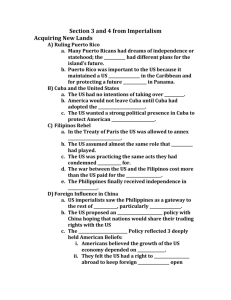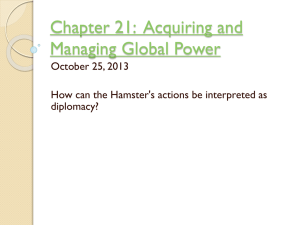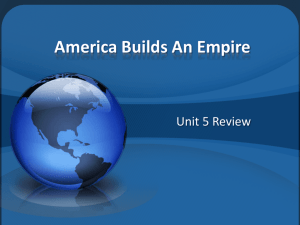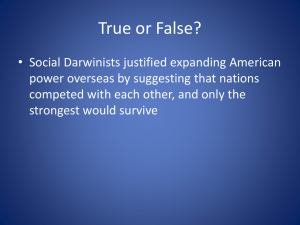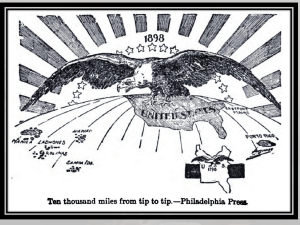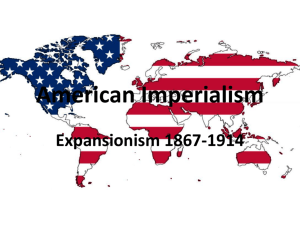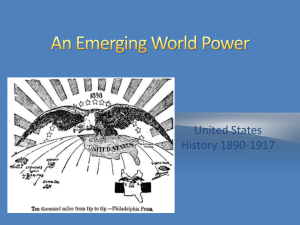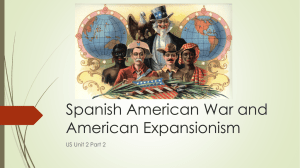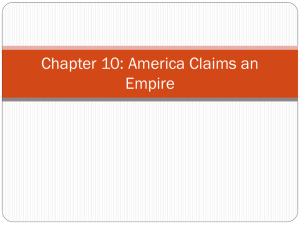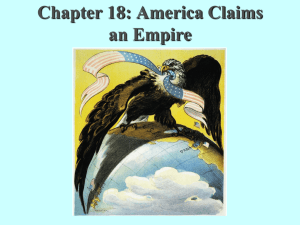Section 10-1 - Streetsboro City Schools
advertisement
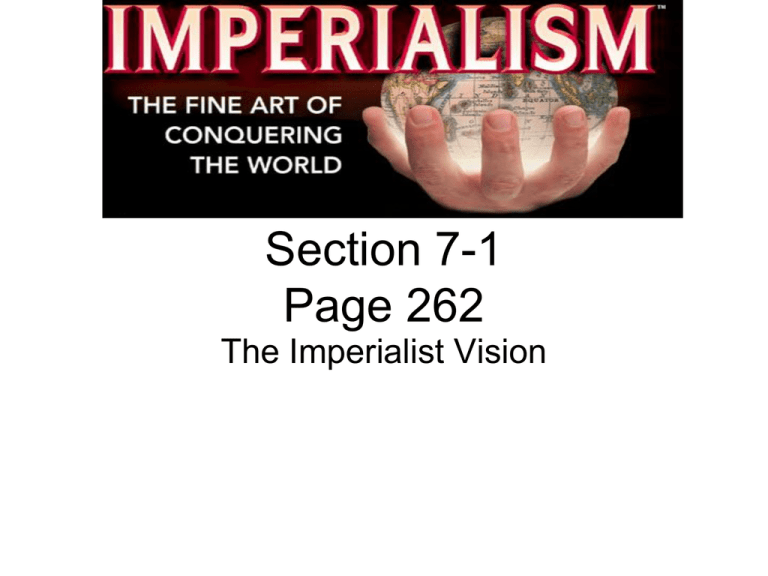
Section 7-1 Page 262 The Imperialist Vision American Expansionism • Imperialism- the policy in which stronger nations extend their economic, political, or military control over weaker territories. Three main factors that fueled American imperialism were: -desire for military strength -thirst for new markets -belief in cultural superiority American Expansionism • Alfred T. Mahan- Admiral in the U.S. Navy. Urged government officials to build up American naval power in order to compete with other powerful nations. The United States Acquires Alaska • William Seward- Secretary of State under presidents Lincoln and Johnson. Early supporter of American expansion. In 1867, he arranged for the U.S. to buy Alaska from the Russians for $7.2 million. Alaska – a mistake? Many Americans thought it was foolish for the United States to buy Alaska from Russia in 1867 because it was so far away and so unknown. However, in 1896 gold was discovered in the Klondike region and a gold rush reminiscent of 1849 began. The United States Takes Hawaii • Pearl Harbor- In 1887, the U.S. pressured Hawaii to allow them to build a naval base at Pearl Harbor, the kingdom’s best port. • Queen Liliuokalani- Came to power in 1891. Wanted to remove the property-owning qualifications for voting. She was overthrown by a revolution organized by Ambassador John L. Stevens. • Sanford B. Dole- He headed the government in Hawaii after Queen Lil was overthrown. He refused to surrender power even after President Cleveland directed that the queen be restored to her throne. Hawaii for the Hawaiians Again Queen Liliuokalani was one of the most renown queens of Hawaii. She tried in 1893 to bring back the monarchy’s authority. She vowed to make Hawaii a place ruled by the native people again. She failed and Hawaii was annexed as a state in 1898. Queen Liliuokalani was the last queen of Hawaii and wrote the famous song Aloha Oe which means “Farewell to thee.” Section 10-2 The Spanish-American War Page 268 Cubans Rebel Against Spain • Jose Marti- Cuban poet and journalist in exile in New York. Launched a revolution in 1895. He organized Cuban resistance against Spain using an active guerilla campaign, and deliberately destroying American owned sugar mills and plantations. He counted on American intervention to help achieve a free Cuba. War Fever Escalates • Valeriano Weyler- Spanish general sent to Cuba to restore order. Tried to crush the rebellion by herding the entire rural population of central and western Cuba into concentration camps. • Yellow Journalism- sensational style of writing, which exaggerates the news to lure and enrage readers. • U.S.S. Maine- American battle ship that exploded in the harbor of Havana. Helped throw America into war with Spain. War with Spain Erupts George Dewey- Commodore of the U.S. pacific fleet. Gave the command to open fire on the Spanish fleet at Manila, the Philippine capital. Within hours his men had captured or destroyed every Spanish ship there. Rough Riders- Volunteer cavalry regiment under the command of Theodore Roosevelt. San Juan Hill- Strategically important. Rough Riders played a minor role in victory, but newspapers declared Roosevelt and his regiment the heroes of San Juan Hill. Treaty of Paris- Treaty signed after the war that had Spain free Cuba, and turned over the islands of Guam and Puerto Rico the United States. It also had Spain sell the Philippines to the United States. United States Expansion in the Pacific, 1867–1899 Section 7-3 Page 276 New American Diplomacy Ruling Puerto Rico • Foraker Act- (1900) Ended military rule in Puerto Rico and set up a civil government. Cuba and the United States • Platt Amendment- (1901) Provisions the U.S. insisted that Cuba add to their newly written constitution. It stated that: -Cuba could not make treaties that might limit its independence or permit a foreign power to control any part of its territory. -the United States reserved the right to intervene in Cuba -Cuba was not to go into debt -the United States could buy or lease land on the island for naval stations and refueling stations. • Protectorate- A country whose affairs are partially controlled by a stronger nation. Filipinos Rebel • Emilio Aguinaldo- Filipino rebel leader. Was outraged when he learned of annexation of the Philippines. Believed that the U.S. had promised independence. Vowed to fight for freedom. Foreign Influence in China • John Hay- U.S. Secretary of State in 1899. He issued a series of policy statements to protect American interests in China. • Open Door Notes- letters addressed to the leaders of imperialist nations proposing that the nations share their trading rights with the U.S., thus creating an open door. This meant no single nation would have a monopoly on trade with any part of China. • Boxer Rebellion- Chinese rebellion against foreign invaders. The Boxers killed thousands of missionaries and other foreigners, as well as Chinese converts to Christianity. International forces from Britain, France, Germany, Japan, and the U.S. marched on the Chinese capital and put down the rebellion after two months of fighting. Panama Canal The United States continued its policy of imperialism under President Theodore Roosevelt. First, the United States encouraged Panama’s independence from Columbia. Then it negotiated a treaty with Panama to build the Panama Canal. Since this canal provided a short cut between the Atlantic and Pacific Oceans, it benefited American trade and thereby also furthered economic imperialism. A map showing the location of the Canal Zone. To secure the U.S. control of the Caribbean, and to give readier access to trade with China and Japan for eastern manufacturers, Roosevelt was an ardent supporter of the building of a canal across the Isthmus of Panama. After using "gunboat diplomacy" to help Panamanian rebel leaders achieve independence from Colombia, Roosevelt signed a treaty with their new nation in 1903 awarding the U.S. control of a canal zone. Construction was from 1904 to 1914. On April 25, 1898, the United States declared war on Spain. The slogan of the war? “Remember the Maine!” Over Quickly, but not Quickly enough The war lasted less than 4 months, but more than 5000 Americans died. The United States was left feeling like a stronger world power. Under the peace treaty, the United States gained control of Cuba, Guam, Puerto Rico and the Philippine Islands. Guam and Puerto Rico are still under US control today. Theodore Roosevelt - a name to remember Because of his part in the war, Theodore Roosevelt was a very popular man. He quickly was elected to public positions and soon became the Vice President of the United States. When President McKinley was assassinated in 1901, Theodore Roosevelt became the new President of the United States.
